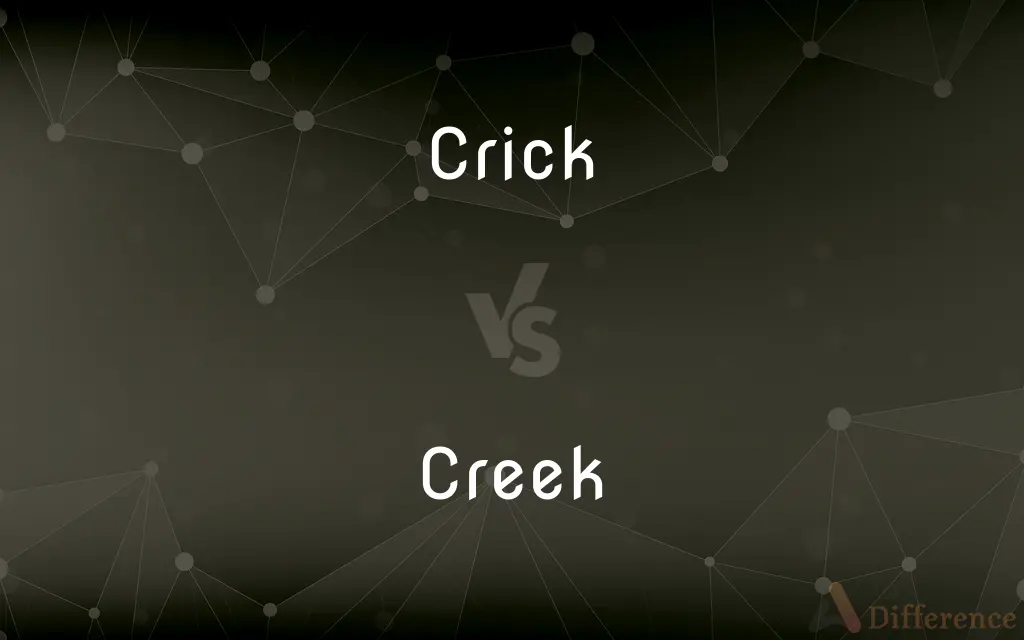Crick vs. Creek — What's the Difference?
Edited by Tayyaba Rehman — By Maham Liaqat — Updated on March 27, 2024
Crick is an informal term for a small stream, whereas creek refers to a small to medium-sized natural waterway.

Difference Between Crick and Creek
Table of Contents
ADVERTISEMENT
Key Differences
The term "crick" is primarily dialectal or colloquial, often used in certain regions of the United States to refer to what is officially known as a creek. It denotes a small, flowing body of water, like a stream or brook, and is more commonly heard in rural or less formal contexts. Meanwhile, "creek" is the standard term recognized across English-speaking countries, describing a narrow, sheltered waterway, larger than a stream but smaller than a river, and can be found in both freshwater and saltwater contexts.
Creeks serve important ecological functions, such as providing habitats for wildlife and contributing to the watershed dynamics. They can be part of larger river systems or exist independently, and their sizes and water flow can vary significantly depending on the geographical location and seasonal weather patterns. In contrast, the use of "crick" rarely implies such ecological or hydrological distinctions; it is more a reflection of regional speech patterns than a specific type of water body.
While "creek" is used universally in scientific, educational, and formal writing to ensure clarity and uniformity, "crick" reflects cultural and regional identity. The choice between "crick" and "creek" can thus also signal the speaker's background or the setting they are referring to, with "crick" possibly evoking a more intimate or localized connection to the land.
Despite their differences in usage, both terms share the commonality of referring to small waterways. They embody how language can vary significantly across different regions and communities, even when describing the same natural features. This variation enriches the tapestry of English, demonstrating its flexibility and regional diversity.
In essence, while "creek" is the standard term used in formal contexts and recognized internationally, "crick" serves as a linguistic marker of regional dialects within the United States, showcasing the diversity of language in describing the natural environment.
ADVERTISEMENT
Comparison Chart
Definition
Informal term for a small stream.
A small to medium-sized natural waterway.
Usage Context
Colloquial, regional dialects in the US.
Standard English, formal and scientific.
Implication
Reflects regional speech patterns.
Used universally, denotes specific size and flow.
Ecological Role
Not specifically defined.
Important for habitats, part of watersheds.
Geographic Distribution
Limited, varies by region.
Widely used across English-speaking countries.
Compare with Definitions
Crick
Indicates a personal or localized connection.
Grandma always called it the crick, not the creek.
Creek
Characterized by its flow and ecosystem role.
Many species rely on the creek for habitat.
Crick
Reflects local dialect and intimacy with the land.
The old mill by the crick is a landmark here.
Creek
Found in both freshwater and saltwater contexts.
Saltwater creeks are vital for coastal ecosystems.
Crick
A regional term for a small stream.
We used to catch frogs in the crick behind my house.
Creek
Used in formal, scientific, and educational contexts.
The study focuses on creek restoration techniques.
Crick
Informally used to describe minor water flows.
After the rain, a little crick formed in the backyard.
Creek
Can vary in size and flow depending on location.
The creek dries up in summer, but it's full in spring.
Crick
Sometimes used interchangeably with "creek" in speech.
The crick is running high after all this rain.
Creek
A small to medium-sized natural waterway.
The creek flows into the larger river downstream.
Crick
(Appalachian) creek
Creek
A member of a Native American people formerly inhabiting eastern Alabama, southwest Georgia, and northwest Florida and now located in central Oklahoma and southern Alabama. The Creek were removed to Indian Territory in the 1830s.
Crick
A painful cramp or muscle spasm, as in the back or neck.
Creek
The Muskogean language of the Creek.
Crick
Variant of creek. See Note at run.
Creek
A Native American confederacy made up of the Creek and various smaller southeast tribes.
Crick
To cause a painful cramp or muscle spasm in by turning or wrenching.
Creek
A member of this confederacy. In all senses also called Muskogee1.
Crick
A painful muscular cramp or spasm of some part of the body, as of the neck or back, making it difficult to move the part affected.
Creek
A channel or stream running through a salt marsh
Tidal creeks teeming with shore wildlife.
Crick
A small jackscrew.
Creek
Chiefly British A small inlet in a shoreline, extending farther inland than a cove.
Crick
The creaking of a door, or a noise resembling it.
Creek
(British) A small inlet or bay, often saltwater, narrower and extending farther into the land than a cove; a recess in the shore of the sea, or of a river; the inner part of a port that is used as a dock for small boats.
Crick
To develop a crick (cramp, spasm).
Creek
A stream of water (often freshwater) smaller than a river and larger than a brook; in Australia, also used of river-sized bodies of water.
Crick
To cause to develop a crick; to create a crick in.
Creek
Any turn or winding.
Crick
To twist, bend, or contort, especially in a way that produces strain.
Creek
A small inlet or bay, narrower and extending further into the land than a cove; a recess in the shore of the sea, or of a river.
Each creek and cavern of the dangerous shore.
They discovered a certain creek, with a shore.
Crick
The creaking of a door, or a noise resembling it.
Creek
A stream of water smaller than a river and larger than a brook.
Lesser streams and rivulets are denominated creeks.
Crick
A painful, spasmodic affection of the muscles of some part of the body, as of the neck or back, rendering it difficult to move the part.
To those also that, with a crick or cramp, have thei necks drawn backward.
Creek
Any turn or winding.
The passages of alleys, creeks, and narrow lands.
Crick
A small jackscrew.
Creek
A natural stream of water smaller than a river (and often a tributary of a river);
The creek dried up every summer
Crick
A painful muscle spasm especially in the neck or back (`rick' and `wrick' are British)
Creek
Any member of the Creek Confederacy (especially the Muskogee) formerly living in Georgia and Alabama but now chiefly in Oklahoma
Crick
English biochemist who (with Watson in 1953) helped discover the helical structure of DNA (born in 1916)
Crick
Twist the head into a strained position
Common Curiosities
Why do some people say "crick" instead of "creek"?
It's often based on regional dialects and cultural traditions.
Are there ecological differences between a crick and a creek?
No, the terms refer to the same types of waterways; the difference lies in language use.
Can creeks be navigable?
Some creeks may be navigable, especially by small boats, depending on their size and water level.
Is "crick" used outside of the United States?
It's primarily a term found in certain parts of the United States, less so internationally.
Can the term "creek" also refer to something in an urban setting?
Yes, creeks can be found in both natural and urban environments, providing important green spaces in cities.
How do changes in land use affect creeks?
Urbanization, agriculture, and deforestation can lead to pollution, altered flow, and habitat destruction.
Why is it important to maintain healthy creeks?
They play critical roles in local ecosystems, water quality, and biodiversity.
Is "crick" an incorrect term to use?
Not incorrect, but it's informal and regional. "Creek" is preferred in formal contexts.
Does the term "crick" have any scientific significance?
No, it's more of a cultural or regional term without specific scientific criteria.
Are there laws protecting creeks and their ecosystems?
Yes, there are various environmental regulations aimed at protecting waterways, including creeks.
What challenges do creeks face in urban areas?
Pollution, overdevelopment, and stormwater runoff are major challenges.
How does one determine if a waterway is a creek or a river?
It typically depends on size, flow, and sometimes local or regional definitions.
What actions can communities take to protect local creeks?
Efforts include cleanup events, restoration projects, and sustainable land use practices.
Why might someone prefer to use "crick" over "creek"?
Personal preference, regional identity, or cultural tradition may influence this choice.
How can individuals contribute to creek conservation?
Through activities like reducing pollution, supporting conservation efforts, and educating others about the importance of these ecosystems.
Share Your Discovery

Previous Comparison
Crimson vs. Maroon
Next Comparison
Leech vs. LeachAuthor Spotlight
Written by
Maham LiaqatEdited by
Tayyaba RehmanTayyaba Rehman is a distinguished writer, currently serving as a primary contributor to askdifference.com. As a researcher in semantics and etymology, Tayyaba's passion for the complexity of languages and their distinctions has found a perfect home on the platform. Tayyaba delves into the intricacies of language, distinguishing between commonly confused words and phrases, thereby providing clarity for readers worldwide.
















































